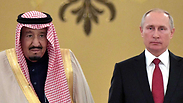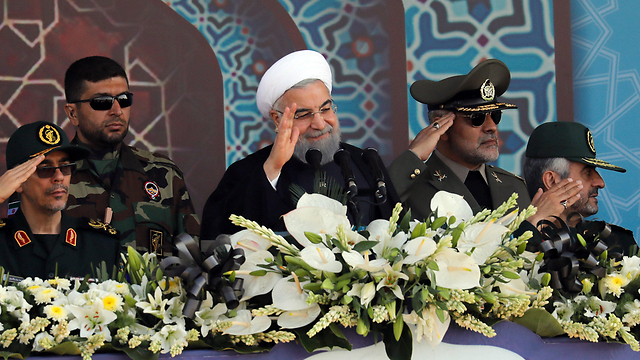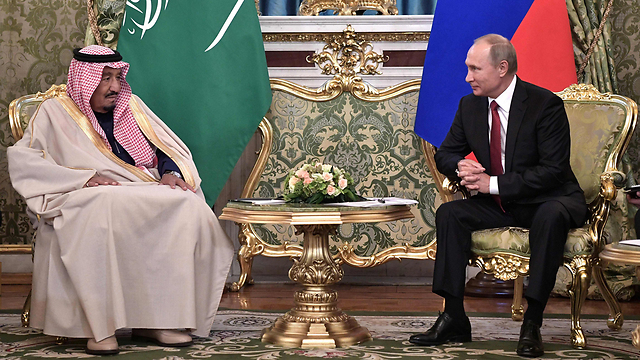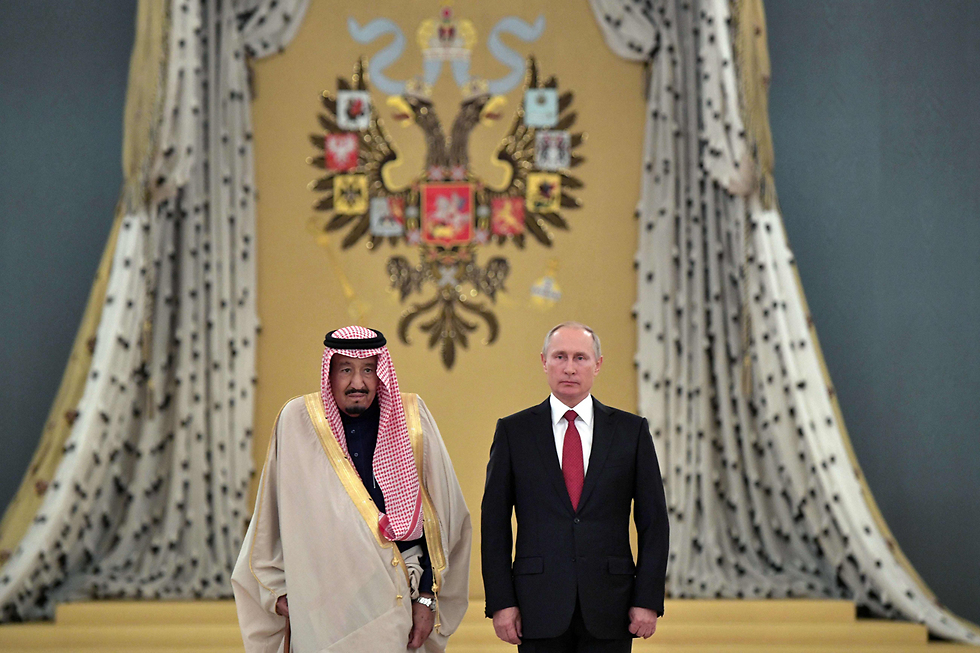
Russian President Vladimir Putin and Saudi Arabia's King Salman on Thursday opened talks in the first official visit of a Saudi monarch to Russia that's expected to focus on oil and the war in Syria.
At the Kremlin's opulent St. Andrew's Hall, Putin in televised remarks hailed the king's visit as a "landmark" event. Salman in his reply called Russia a "friendly nation" and said his country is committed to strengthen ties "in the interests of peace and security."
At the core of Saudi Arabia's regional woes is its rival Iran, which is backed by Russia. The Shiite-led regional power has spread its footprint throughout the region, particularly in Iraq and Syria. Saudi Arabia is at war with Iranian-allied rebel fighters in Yemen and is embroiled in a diplomatic standoff with Qatar, which has found support from Tehran.
"Iran must stop intervening in the region, especially in Yemen," the Saudi king told the Russian president during their meeting.
Salman also made it clear that his kingdom supports the establishment of a Palestinian state and wants to see East Jerusalem declared its capital.
When mentioning rifts within other countries in the region, Salman noted that in his opinion unity and political solution must be reached to promote regional stability, calling for a diplomatic solution to the Syrian civil war and advocating against the Kurdish secession.
"The territorial integrity of Iraq must be preserved," said the Saudi king.
Hosting the Saudi king in the ornate Kremlin interiors, Putin hailed his visit as a "landmark event" that will give a "strong impulse" to bilateral ties.
"I believe that your visit will give even greater impetus to foster relations between our two countries," the Russian president said, confirming that he would honor the king's request for a reciprocal visit to Riyadh.
"We aim to strengthen relations with Russia in order to promote stability in the world," Salman replied. "We have common agreement on many issues and Saudi Arabia will continue its efforts to fight extremists and terrorism and to foil its sources of funding."
Salman then called on the United Nations to establish an anti-terrorism organization.

Relations between the two countries have often been strained. During Cold War times, the Saudis helped arm Afghan rebels fighting against the Soviet invasion.
The kingdom, much like Russia, has been hit by the fall in oil prices since mid-2014. Despite regional disagreements, the two major oil-producing nations found common ground on energy policy in November, when they led a deal between OPEC and non-OPEC states to cut production in a bid to shore up crude prices. So far that deal is holding.
Saudi Arabia's top energy officials are expected to take part in the talks, and the chief executive of oil giant Saudi Aramco is also visiting Moscow this week.
Russian Energy Minister Alexander Novak told Russian news agencies earlier Friday that non-OPEC states would be willing to extend the output cut "if necessary."
Russia and Saudi Arabia are expected to announce large investments and joint ventures to further cement relations. Trade volume between the two countries reached $2.8 billion last year, according to official Saudi press.
Saudi Arabia's Public Investment Fund, the kingdom's sovereign wealth fund, announced in 2015 plans to invest $10 billion in Russia over the next five years, though only a fraction of that has so far been put up.
The Saudis have also been eyeing Russian nuclear power technologies and appear ready to expand food imports from Russia, which is set to remain the world's biggest wheat exporter this year. Food security is a major concern for Saudi Arabia, which stopped local production of livestock feed and wheat due to water scarcity.
Analysts say Salman's trip to Moscow is the clearest sign yet that Russia's strategy in the Middle East, including its high-risk show of military power in Syria, has paid off.
Salman's visit caps off a number of visits to Russia over the past two years by Gulf royals, including by his heir and son.
"A number of Gulf leaders have been going with greater regularity to Moscow and I think for a simple reason: Russia has made itself much more of a factor in key parts of the Middle East as the US has taken a step back in some ways, particularly in Syria," said Brian Katulis, a senior fellow at the Center for American Progress.
The Saudi monarch's visit comes after decades of strained relations. Since the Saudi state's founding 85 years ago, the kingdom and Russia have been on opposite sides of major conflicts—Saudi Arabia sided with the US in the Cold War, and helped arm mujahidin fighters against Soviet forces in Afghanistan in 1979-1989.
More recently, tensions were high over the war in Syria. Russia and Iran have staunchly backed Syrian President Assad while Saudi Arabia has supported the Sunni rebels fighting to oust him.
However, relations have begun to improve in recent years and Salman's heir, Crown Prince Mohammed bin Salman, has held several meetings with Putin.
Though Salman's visit signals closer Russian ties with Sunni Arab Gulf states, Russia's support for Iran is not expected to change.
The US, meanwhile, remains Saudi Arabia's top weapons supplier and its most critical Western ally.
Anna Borshchevskaya, a fellow at The Washington Institute for Near East Policy, says Russia has no capacity to replace the United States as Saudi Arabia's key ally.
"That said, it's clear that Russia has been able to play a weak hand very well and step into vacuums everywhere where the US has treated," he said.
Saudi-US ties were strained under the Obama administration over its backing of a nuclear agreement with Iran and its handling of the Syrian conflict. Relations improved under the Trump administration, but Washington's focus in Syria continues to be on fighting the Islamic State group, not on ousting Assad.


















